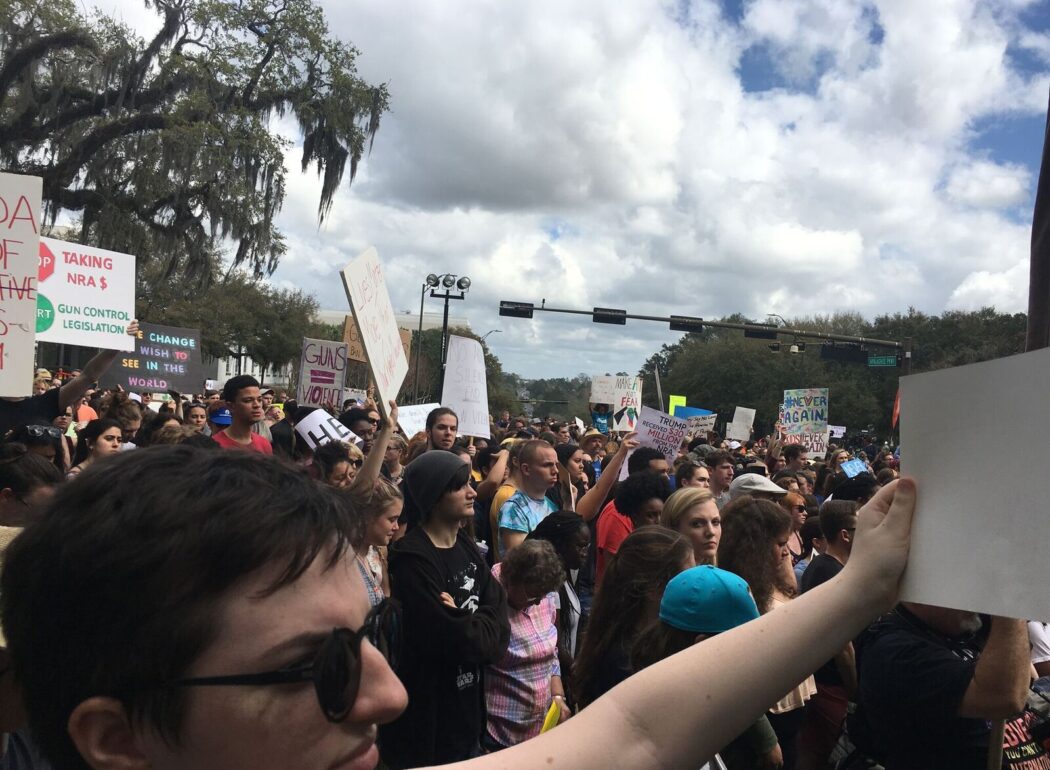On February 23 and 24, Michael Dreyer interviewed students and adults who descended on the state capital of Tallahassee, Florida to call attention to the need for legislative action on gun violence.
Exactly one week after the horrific February 14th shooting at Stoneman Douglas High School in Parkland Florida, cheers of “Enough is Enough” rang out across the capital city of Florida and the nation. From coast to coast, city to city, and FAMU to FSU the voices came from a politically mixed crowd. Some clearly had political experience and had attended rallies before. However, the vast majority were clearly new to this, being introduced to classic chants of “Show me what democracy looks like!” and “I believe that we can win!” In Tallahassee, multiple attendees told me this was their first political experience. Some said they hadn’t even voted before. All were inspired to come and march by a courageous group of students who in less than a week had gone from average high school students to firebrand activists: more than most citizens do in a lifetime. The night before, the Florida legislature chose to vote down an assault weapons ban. Vocal survivors were being called crisis actors, and NRA reps were blaming modern video games and movies for violent children.
The trenches had been firmly dug by opponents of gun reform, and the survivors were itching for a chance to fight back.
At the rally, gubernatorial candidate and Tallahassee mayor Andrew Gillum led the march from FSU’s campus to the Capitol. Speaking from a megaphone, he asked students to grasp “the fierce urgency of this moment,” and speak for the victims of the Sandy Hook massacre who were “babies whose words were barely formed.” National House Democratic candidate for the 2nd district of Florida Bob Rackleff, warned Republicans that the “world was watching them.”
“Never again,” “Vote them out,” and “We won’t stop until our leaders take action.” These were the words of the survivors of the Stoneman-Douglas Massacre who I interviewed. They were beyond passionate, organized, and had no patience for the partisan deadlock of modern America. They wouldn’t let apathy and dire acceptance win the day. This was Generation Z, taking on big party machines and the gun lobby of the United States; a modern David vs. Goliath story.
Across the nation, many Millennials stood lock-step behind their younger peers at marches, walk-outs, and protests. However, Millennials will need to prove if they are both truly committed to this push for stricter gun control and willing to take action over it. According to a new segment (opens in a new window) on All Things Considered, millennial views on gun control seem lukewarm at best. Couple this with their apathy at the polls (only 49.4% voted in 2016) (opens in a new window), and Generation Z has a wavering ally. They too lived through the current epidemic of mass shootings, yet haven’t proven nearly as resolute or effective.
Baby Boomers and Gen X-ers, many of whom were largely parents and teachers also came out in force to Florida’s Capitol. The parents, sick and tired of feeling a looming dread every time they kissed their children goodbye to go to school. The teachers, disgusted by political pundits suggesting that they become bodyguards in addition to the infinite other responsibilities they have to their students. The consensus among all four of the educators I spoke to, retired and active alike, was that the idea of arming teachers was at best “impractical,” and at worst “absolutely ludicrous,” as one teacher who survived the Stoneman-Douglass massacre put it. As an educator myself, it seems to me that either proponents of arming teachers have never had to control a large class of young children, or they have completely unrealistic expectations of a teacher’s ability to act under the most extreme kind of pressure.
The words of the Stoneman-Douglas students have been shared endlessly across social media platforms and 24-hour news outlets and have resonated across age and political ideology. I met one man named Mr. Art Johnstone, who is a business owning, self-described “conservative, gun owner, and lifelong hunter” who attended the “Florida March for Gun Control” in order to pass out pamphlets promoting banning military assault rifles. He contended that weapons like the AR-15 were only built to “kill people” and were unlike the vast majority of hunting rifles and rational self-defense armaments. When I asked him if he had any words of encouragement for the students of Stoneman-Douglas, he stated, “I’ve never been to a political rally in my life” he said. “I’m a Republican, and I’m actively here. So keep it up.”
The rally at the steps of the Old Florida Capital attracted upwards of three thousand citizens by the end of the day. It was impossible not to hear the chants from inside the capitol building.
No matter how this battle continues, I believe the most important words said that day came from a police chaplain who was there providing counseling to both Leon County and Parkland students. He had courageously been present in the immediate aftermath of the Pulse massacre and other terrible incidents of violence. When I asked if he had a message for America’s leadership he said somberly after a sigh, “If they had to do what we do for one day, they would have stepped their game up and fixed the problem already.” He continued, saying, “People should get behind these kids, so something can be accomplished.” America and these kids deserve something, anything to help them feel safe in places of learning. After meeting survivors and newly made young activists, it’s clear to me that if their elders don’t provide them with support then they will take it upon themselves to move the needle. As one 16 year old attendee named Kimmy told me: “Hearing ambulances at school takes on a whole new meaning. I shouldn’t have to feel this way. I hope these survivors keep fighting; a legacy is being built.”
As of March 8th, both houses of the Florida legislature have passed the “Marjory Stoneman Douglas High School Public Safety Act”. It notably does not include a statewide ban on the sale of AR-15 style semiautomatic rifles, a major policy request of both educator’s and students from Parkland that I spoke to. However, it does push the legal purchasing age of all firearms to 21, in addition to banning bump-stocks, adding on a three day waiting period for most firearm purchases, and instituting a “red flag” policy that would enable Florida law enforcement to seize firearms from those “deemed mentally unfit or a threat.” Most controversially perhaps, it allows for some school employees to be armed if they meet a myriad of qualifiers. The only signature left is that of Governor Rick Scott (R), who hasn’t said whether he would or would not sign. The ball is in his court, and from my experience, the students of Parkland and the entire nation will be watching.
Visit kqed.org to learn more about youth led protest movements (opens in a new window).


